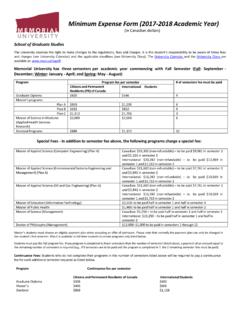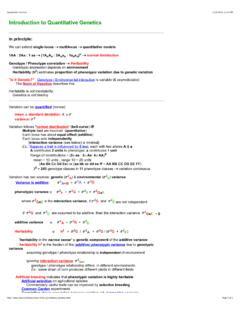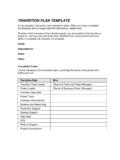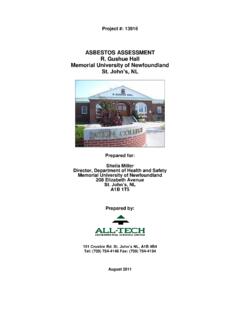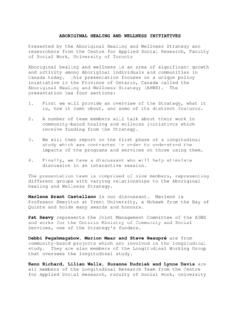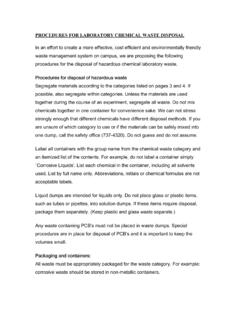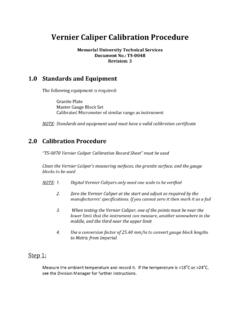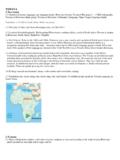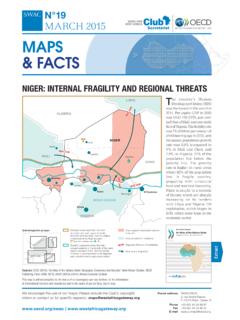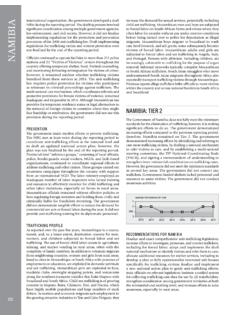Transcription of 1 Aspect and tense - Memorial University
1 Chapter One Page 1 1 Aspect and tense Aspect Perfective, Perfect, Factative While a minority of niger -Congo families have tense contrasts, all have Aspect . Five aspects are widespread in niger -Congo: Factative (FAC)/ Perfective (PFV), Imperfective (IPFV), Perfect (PFT), Progressive (PRG), and Habitual (HAB)/Iterative. Others are less widespread and not dealt with here in any detail: Inceptive, Situative, etc. Since parts of this statement might not seem self-evident to some readers, it needs explanation. Perfective denotes a complete situation and often indicates the completion of a situation when contrasted with an imperfective situation (Comrie 1976:18,19). There is an obvious close connection between perfectives and past situations, because it is past situations that are most often complete.
2 In many languages perfectives can also represent non-past situations. Perfect1 denotes a situation that started in the past but continues into the present or the continuing present relevance of a previous situation (Comrie 1976:52, also Bybee et al (1994:54,57,318). It focuses on the result phase, immediately subsequent to the situation. Examples: Bajuni (Swahili dialect) i-ndo-vunda It is rotten. (-vunda is a stative2 verb), but Masudi ndo-andoka Masudi has gone out. (-andoka is a dynamic verb). Factative3 is not likely to be familiar to many readers outside West African linguistic circles. Attention was first drawn to it by Welmers (1973:346), whose formulation has been repeated since in slightly modified form by others ( Faraclas 1984, 2007, Faraclas et al 2007).)
3 In this formulation, Factative has two characteristic features. Structurally, it is nearly always an unmarked form, either a zero form or the least marked aspectual form in a language. In particular, in contrast with Imperfective, it will generally be the unmarked form. Functionally, when used with non-stative or dynamic verbs, it typically represents past, complete, situations, but when used with stative verbs, it represents current, non-past, incomplete, states, that is, presents or futures. Welmers (ibid) says: (Factative) expresses the most obvious fact about the verb in question, which in the case of active verbs is that the action took place, but for stative verbs is that the situation obtains at present.
4 Although that characterization fits many cases of Factative in the sample languages, it does not fit all. Structurally, some languages ( Bambara, Bijago, Degema) have added new suffixes at FV to mark Factative, while others ( Ejagham, Godie) mark the contrast between FAC and IPFV only by tones, so it is hard to tell which is the unmarked form. Functionally, while Factative representing past situations with dynamic verbs and present situations with statives is the normal situation with most of the sample languages, it has expanded its role in some language. Thus4: 1 Also called Retrospective or Anterior. 2 See Comrie (1976:48) for state versus dynamic situation.
5 3 Also called Aorist or Performative. 4 These are not the only examples. Childs (1998:314, fn 121) that the Perfective (our Factative) can be used of the imminent future, and in Makaa the Factative can translate as be about to verb . Chapter One Page 2 (1) Expanded role for Factatives in some languages a Doyayo mi3 kpe4l- 4 I pour or I poured mi1 kpe4l- 4 I will pour (remote future) b Ejagham a-gb 3s fell (past) t g a-gb 3s will fall (future) c Obolo n-ge kp I write a letter or I wrote a letter d Otoro liji li-rit- People dance liji li-rit- likarage People danced yesterday i gwu-dir- I sleep or I slept e Yoruba mo-o I go , I went , I will go f Zande mi-kp r- I divided (the meat) mi-n -kp r- I always divide mi-a-n -kp r- I will divide.
6 Right away All the forms in (1) are Factatives. In some (Doyayo, Obolo, Otoro) the Factative can represent past or present with any verb, and in Yoruba it can even represent the future. Time is clarified by the context or by use of a time adverbial. Change of tone makes the Doyayo Factative into a future: addition of a time adverbial has the same effect in Ejagham: and use of prefixes produces various functional effects in Zande. John Hewson has examined the analysis of Akan by Boadi (2008), who deals with the functions of a form he calls Habitual. These include several factative-like functions but also others which are reminiscent of performatives ( I bet you X ), leading Hewson to conclude that Performative would be a better label than Factative, because the functions of such forms are wider than those outlined for Factative by Welmers.
7 Because this chapter focuses on African languages, it retains Factative, but Hewson discusses Performative further at the end of this manuscript5. It ought to be clear from what has been said so far about Perfective, Perfect, and Factative that they share areas of overlap so the differences and similarities need to be made clear. Perfective and Perfect both represent complete situations but whereas Perfectives show no particular connection to the present ( He lived in Lagos for twenty years , the implication being that he doesn t now), Perfect representations do show such a connection ( He has lived in Lagos for twenty years , the implication being that he still does). Perfects and Factatives are superficially quite similar to each other, especially in their both distinguishing dynamic from stative verbs.
8 They differ structurally, in that Factatives are typically unmarked, whereas Perfect marking tend to derive from grammaticalizing auxiliary verbs such as finish or by modifying Perfectives in some way. They differ functionally in their attention to the result phase, which is 5 Performative is discussed at some length in Hewson & Bubenik (1997:10-18). Chapter One Page 3 central to Perfects but not important to Factatives. Finally, Perfectives and Factatives differ most obviously in their treatment of stative verbs: Perfectives have the same morphology for both and the same, complete, meaning for both kinds of verb, where Factatives have the same morphology for both but have different meanings. One characteristic feature follows from this discussion of Factative, Perfective, and Perfect.
9 Together they make for a crowded semantic and functional space and it is in fact exceptional that all three co-occur6. It is especially unusual for Perfective and Factative to occur together, while the co-occurrence of Perfect and Factative is quite common in niger -Congo (see (2)), as is Perfective and Perfect elsewhere. Incompletives Standing in contrast to Factatives and Perfectives is a set of incompletive categories: Imperfective, Progressive, Habitual/Iterative, (and others). The term Imperfective occurs with two meanings in the sample languages. In some languages it is a superordinate, being the only incompletive category to contrast with Factative (or Perfective). This can be seen in (2) in Bambara and Degema.
10 In other languages it is one of several incompletive categories, co-ordinate with Progressive, Habitual, Iterative, and others. In both usages, Imperfective is a wide incompletive, seeing a situation from the inside: the situation has started, the speaker knows not when or it is unimportant, it is ongoing, and will likely continue. Progressive is a more focused type of imperfective, which narrows attention to the temporal space around the time of reference or speaking. As such, it is incompatible with stative verbs, whose emphasis is on more permanent state (*I am knowing). The class of stative verbs has a fairly common core across languages but has some intralinguistic variation. Habitual represents a of an extended period of time, so extended that.
